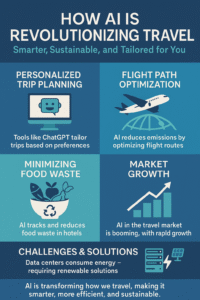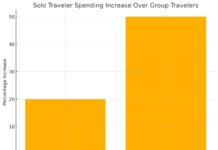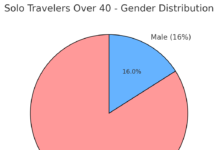
AI is completely reshaping the travel world, turning every journey into something more intelligent, efficient, and eco-conscious. From personalizing your trip planning with tools like ChatGPT to optimizing flight paths that reduce emissions, artificial intelligence is redefining how we travel. For instance, AI-powered trip ideas, like those detailed in Google’s latest research, are striking the perfect balance between creativity and practicality—taking into account everything from real-world logistics to your wanderlust-inspired daydreams.
And let’s talk sustainability—AI is helping reduce aviation emissions by streamlining flight paths, like in Google’s partnership with American Airlines to slash contrails by over 50%. It’s also battling food waste in hotels (with Iberostar saving over 1,100 tonnes of food in 2023) and guiding us toward eco-friendly choices—Google Maps now offers sustainable rail routes, for example.
But it’s not all roses. Data centers powering AI come with their own carbon footprint. With Google’s emissions jumping 50% between 2019 and 2023, it’s clear that while AI can help the planet, it’s also consuming plenty of energy. The solution? Renewable energy and energy-efficient algorithms, of course!
AI’s Impact: From Market Growth to Personalized Experiences
The AI in travel market is absolutely booming. By 2030, it’s expected to hit USD 13.38 billion, growing at a 28.7% annual rate. That’s not just a nice-to-have technology—it’s set to generate trillions of dollars in value for travel businesses. As we speak, the market is evolving rapidly, with key players innovating in ways that blend personalization with sustainability.
At the Arabian Travel Market (ATM) 2025, the spotlight was on AI’s role in driving sustainable tourism, from regenerative practices to the rise of gaming tourism. Tools like Kayak’s AI-powered collaborations are already shifting consumer behavior in fascinating ways.
How AI Makes Travel Smarter and More Sustainable
It’s clear: AI isn’t just transforming the logistics of travel; it’s revolutionizing how we experience it:
-
Personalised Trip Planning: Tools like ChatGPT make it easier than ever to plan trips that are made for you. Whether you’re after an eco-friendly retreat or family-friendly fun, AI can curate your dream vacation. A 2023 TIME article even found that one-third of travelers are now using AI for trip planning.
-
Real-Time Alerts: Whether it’s a weather disruption or political unrest, AI keeps you updated on everything, helping you make smarter decisions while traveling. In 2024, Techtic highlighted how this real-time information is becoming essential for immersive, safe travels.
-
Airport Operations: Say goodbye to long lines and wasted time. AI streamlines airport operations, from baggage screening to biometric testing, cutting down on queues and improving overall efficiency. Changi Airport’s efforts in reducing paper usage with AI are a perfect example of the future of travel.
-
Future Trends: We’re also seeing the rise of AI-driven virtual reality tours and hotel robots that can make our stays more personalized. This could even reduce the need for physical travel—game-changing, right?
Sustainability at Its Core
AI isn’t just about convenience—it’s a major player in making travel more sustainable:
-
Flight Path Optimization: AI’s ability to optimize flight paths is leading to less fuel consumption and fewer emissions. With projects like American Airlines’ Project Contrails, contrails (which have a huge impact on aviation’s warming) can be reduced by more than 50%.
-
Predictive Maintenance: AI is making sure your flights are on time by predicting maintenance needs, which means fewer delays and cancellations—and less unnecessary energy consumption.
-
Food Waste Reduction: AI helps hotels track food waste, and the results speak for themselves. Iberostar, for instance, saved over 1,100 tonnes of food waste in 2023. Even KLM’s AI model helped reduce food waste by 63%.
-
Sustainable Choices: Google’s Maps and Search are now guiding travelers to sustainable options, from rail routes to EV charging stations. It’s a win for both the planet and the traveler.
-
Managing Overtourism: AI uses real-time data to predict peak visitor times, helping to spread tourists more evenly and reduce the strain on overvisited sites. It’s a simple yet effective way to maintain the balance between tourism and preservation.
-
Biodiversity Conservation: AI-powered conservation efforts, like those by Rainforest Connection in Ecuador, are using solar-powered audio recorders to monitor wildlife and prevent poaching.
Market Growth and Economic Impact
The AI market in travel is growing at an astonishing pace. By 2030, it’s projected to reach a whopping USD 13.38 billion. Generative AI alone earned USD 632 million in 2022, and by 2032, it’s set to soar to over USD 3.58 billion. This growth underscores just how transformative AI will be for travel businesses, with the potential to unlock trillions in value.
Recent Developments in AI Travel
As we dive deeper into 2025, AI is continuing to make waves in travel:
-
SaharaLabsAI: They’re developing carbon calculators that help travelers offset their footprints, with decentralized data recommending low-emission routes. Talk about forward-thinking!
-
UN Global Pulse Uganda: AI is not only changing how we travel but also how we sustain it. Their June video discussion showcased personalized travel planning and sustainability tools, making tourism smarter.
-
Fetch.ai: AI-powered travel assistants are becoming more integrated into our lifestyles, helping to redefine how we manage our trips and adjust to new experiences.
Challenges and Solutions
Sure, AI is making travel smarter and more sustainable, but it also brings its share of environmental concerns. Data centers, for instance, use a staggering amount of energy. However, innovative solutions like renewable energy use and more efficient algorithms are helping to offset these impacts.
Conclusion
AI is the future of travel. It’s smarter, more personalized, and helping us become more sustainable. From cutting emissions in the skies to reducing food waste at hotels, AI is tackling some of the industry’s biggest challenges. And while we still face some environmental concerns about AI’s energy consumption, solutions are on the horizon. The evolution is happening right now, and 2025 promises to be a big year for AI-driven travel innovation.























